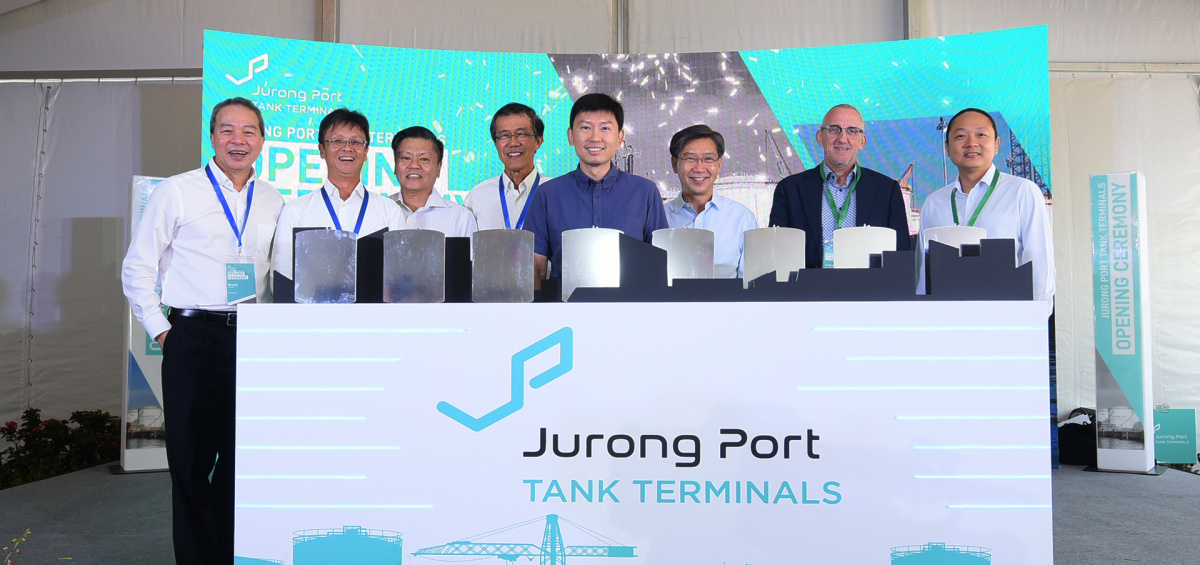SINGAPORE, 29 July 2019 – Jurong Port Pte Ltd and Oiltanking officially opened Jurong Port Tank Terminals (JPTT) today. The Opening Ceremony was officiated by Mr. Chee Hong Tat, Senior Minister of State, Ministry of Trade and Industry & Ministry of Education. The event is an important milestone for Jurong Port as JPTT aims to reinforce Singapore’s position as a global energy and chemicals hub. The event was attended by representatives from the maritime and petroleum industries.
JPTT is a key pillar of Jurong Port’s strategic vision of becoming a next generation multipurpose port through the development of port-centric ecosystems. A joint venture between Jurong Port and Oiltanking GmbH, JPTT began construction of Phase 1 in May 2017 and is expected to have total capacity of approximately 550,000 cubic metres of clean petroleum product storage upon completion of Phase 2, fortifying Singapore’s position as a global energy and chemicals hub.
Ooi Boon Hoe, Chief Executive Officer of Jurong Port and Chairman of JPTT, said, “This is a significant step for us as we move forward with our vision to become Singapore’s next generation multipurpose port. We see Jurong Port Tank Terminals as a key part in the renewal and upgrading of Singapore’s competitiveness in storage infrastructure. The joint venture with Oiltanking will meet the demand for top quality and integrated storage infrastructure emerging from petrochemical product flows into Southeast Asia.”
JPTT is located on 16 hectares of land within Jurong Port and is supported by 4 deep water berths with drafts of up to 17.6 meters, capable of handling vessels up to 180,000 deadweight tonnes (DWT). The terminal will also be connected via pipelines to the Jurong Island petroleum and petrochemical network thereby enabling seamless transfer of products for storage, distribution and trading.
JPTT is expected to handle about seven million tons of clean petroleum product annually.
Douglas van der Wiel, President of Oiltanking Asia Pacific said, “The need for supporting infrastructure to manage the increasing demand in Asia for petroleum products created the need for JPTT. The terminals will be able to handle the demand from the region and help strengthen the integrated terminal network concept and overall value offering to the market. This is the embodiment of Oiltanking’s vision for the Singapore Straits, reinforcing Singapore’s international maritime energy and chemicals hub status.”
A strong history of innovation
Jurong Port has maintained a culture of innovation and it has transformed to meet the nation’s requirements. Established in 1965, the port has expanded to serve as Singapore’s main general and bulk cargo gateway. Since its corporatisation in 2001, the port has continued to evolve to cater to Singapore’s industries. To ensure progress and meet the growing demands of the nation, Jurong Port adopted a new operating model to transform from a landlord port to a port operator. This model allowed for more efficient and safer cargo handling, as well as created value in the supply chains for industry clusters.
The development of the new liquid bulk terminal is an important milestone in Singapore’s national history. It will help the city-state capitalise on the many opportunities in the energy and chemicals market, and reinforce its status as a global hub. Together with Oiltanking, both parties can now leverage each other’s expertise and years of experience to drive success and strengthen the integrated terminal network concept and overall value offering to the market.
For media inquiries, please contact:
Kate Tan
Manager, Corporate Relations & Communications
mediarelations@jp.com.sg
6265 0666





